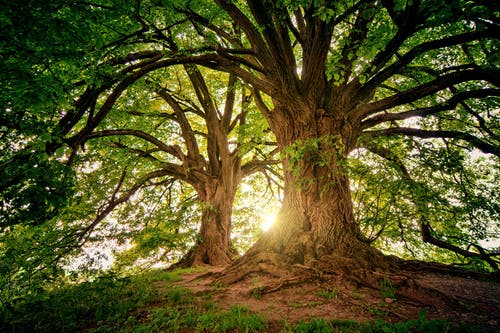The healing power of trees – my article for Psychologies

Trees provide breathable air, timber, fuel, food, shelter, medicine and beauty. Without trees, we could not live. They can help us think better – Plato and Aristotle did their best thinking in the olive groves around Athens, Buddha found enlightenment beneath a bo tree, and Isaac Newton realised his theory of gravity when an apple fell from the tree under which he was sitting – and they can help us feel better.
Many of today’s pharmaceuticals are derived from trees. Aspirin comes from willow bark; yews are the source of Taxol, used in the treatment of some cancers; ginkgo biloba improves circulation; tea tree oil is beneficial for skin infections; cinchona tree bark contains quinine, the basis of many anti-malarial drugs; and Pycnogenol, which protects against deep vein thrombosis, is made from pine tree bark.
And doctors are realising that the environment in which patients recover is just as important as the medicines they take. New York’s Mount Sinai Hospital was redesigned so that all the recovery wards have a view of Central Park. Roger Ulrich, director of the Center For Health Systems And Design at Texas A&M University, found that just being in a green space reduced stress levels and blood pressure within three minutes.
Researchers at the University of Illinois studied a large housing development comprising 28 tower blocks and found that those residents who lived with trees nearby socialised with their neighbours more, felt safer and suffered 52 per cent fewer crimes. They felt emotionally and physically healthier than those in ‘treeless’ blocks.
Healing powers
‘Just being among trees is good for wellbeing,’ says Barbara Hall of the Tree Council. ‘The importance of trees to health is something we promote in our annual Walk In The Woods month in May. Trees make a lovely setting for walking, an activity shown to reduce stress and illness.’
As well as walking in the woods there are other ways to feel trees’ benefits. ‘I’m a tree hugger and proud of it,’ says life coach Karin Marcus. ‘When I surround myself with trees, my breathing becomes deeper, my senses are satiated. I feel peaceful and grounded.’ The Japanese have a word for this feeling – shinrin-yoku, or forest bathing.
In 2004, Japan’s National Land Afforestation Promotion Organisation conducted an experiment and discovered that a forest stroll had beneficial effects on blood pressure, heart rate and the immune system. They also found that people who just looked at a forest view for 20 minutes had a 13 per cent lower concentration of the stress hormone cortisol.
As well as the physiological benefits of trees, attention is turning to the relatively new field of eco-psychology. This is based on the notion that our disconnection with nature is a central factor in many of our emotional woes.‘My Walks And Talks in the woods help clear the mind simply by breathing in the fresh oxygen being emitted from the leaves,’ says Marcus. ‘The sounds, smells, sights, textures and even taste of the air enliven all five senses. I use trees as a metaphor for self-examination by acknowledging our roots, finding our heartwood, and focusing on how we can branch out to provide shade and fruits for others.’
Complementary therapist Annie Day practises tree spirit healing. Tree ‘witnesses’ (leaves, twigs, bark and cones) are placed on or near the body, while tree essences are given orally or drops are placed on the wrists and inhaled, or on chakra points or an injury. ‘The energy of trees can help any mind, body or spiritual problem,’ claims Day. ‘It’s also a deeply relaxing experience.’
Our pagan ancestors worshipped trees, but for many of us nature has been pushed out of our lives. ‘In the folk tradition of Europe trees were attributed magical healing powers,’ says Cassandra Eason, an expert on earth energies and author of ‘Encyclopaedia Of Magic & Ancient Wisdom’. ‘I’m a busy working mother and whenever I feel stressed, unwell or unloved, I sit against the trunk of a tree, making a connection with the ground and through the bark with the energy flowing upwards from the earth. I put my hands on the ground and press down with my feet, picturing negative feelings as dark light sinking into the earth.’
Doctors are embracing the benefits of trees, too. Rather than prescribing antidepressants, GPs in Telford, Doncaster and Camden, north London, are referring patients suffering from stress, depression or anxiety to Green Gyms where they can get involved in conservation projects. Research by Oxford Brookes University shows that cardiovascular health benefits from exercise and fresh air, but woodland surroundings have a calming effect that assists recovery more than a gym. Modern medicine often sets the physical and the emotional apart, yet with their roots firmly in the ground and their branches reaching up to the skies, trees remind us that the two are planted firmly together.
See the original article in Psychologies Magazine here.
